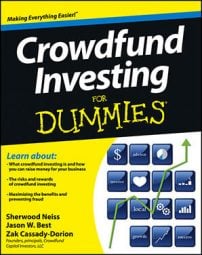The minute you start thinking about investing in a company through crowdfund investing, you assume responsibility to help watch for fraud. The power of the crowd — which includes you! — is precisely what makes crowdfund investing so great.
Historically, fraud has taken place one on one. In other words, one person (such as a crooked financial advisor) dupes one other person (such as a single investor). In crowdfund investing, for fraud to exist, one person will have to fool many, many people in a very public forum (the online funding portals and social media). Good luck, fraudsters!
As you’re studying campaigns, asking questions, and monitoring crowd feedback on various business models, you may find that something raises a red flag. If that’s the case, you have a responsibility to take action.
Trust that the crowd can spot signs of trouble
Before Bernie Madoff’s name became permanently associated with a mind-boggling investment scandal, many people had major doubts about his claims. Some of them refused to invest because they knew what he was doing was a scam. But the primary outlet they had was to raise questions to Madoff’s team, which meant (of course) that no other potential investors ever got to hear them.
Crowdfund investing changes the playing field. When one person has a doubt, it can quickly and powerfully become everyone’s doubt. Mind you, this fact makes life tough for an honest entrepreneur who may have a paranoid potential investor in his crowd.
One person can potentially raise lots of doubts about a legitimately good business plan being promoted by someone with the skills to make it a success. Is that fair? Maybe not. But it’s not entirely a bad thing. Raising money from investors is not and should not be an easy thing to do.
Crowds are going to be able to spot signs of trouble shortly after they arise. The collective knowledge of the crowd is greater than the knowledge of any single person or small group of people. If 2,000 people have decided to invest in a business through crowdfunding investing and none of them has raised any serious concerns in the online discussion forums, let this be a good sign to you.
However, if you see a problem — even if you’re the only one to do so — you can’t be scared to call it to the crowd’s attention. If your concerns are unwarranted, the crowd will help you figure that out. If you’ve spotted something truly troubling, the crowd will thank you for stepping up to your responsibility.
Report your suspicions to the funding portal
If you’ve seen something in a crowdfund investing campaign that has raised your suspicions, you should first ask about it in the dialogue section of the campaign itself. But then you need to go a step further and report your suspicions to the online funding portal.
Funding portals should take every complaint and suspicion extremely seriously; they have a legal responsibility to do so. Funding portals are monitored by the SEC, and the SEC is always looking for any signs of fraud. If the SEC finds a problem and the funding portal knew about it (and failed to report it), that portal will suffer for its poor choices.
Plus, there’s no worse press for a funding portal than allowing fraud to happen on its website. Everyone in the crowdfund investing community will hear about it, and potential investors will think twice before investing in a company listed on that website.

